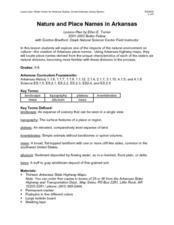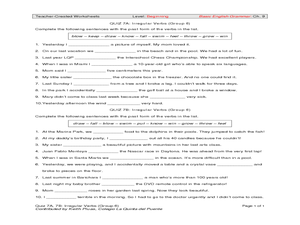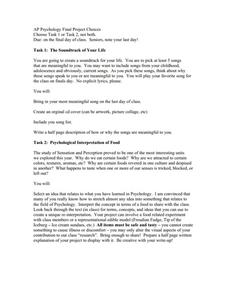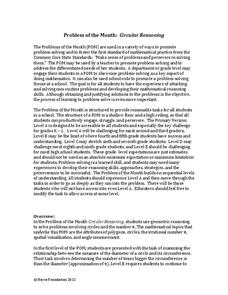K12 Reader
Commas and Coordinating Adjectives
Ensure that your pupils keep their coordinate adjectives separated with commas. For this practice exercise, learners determine if five sets of adjectives are coordinate or not. They rewrite the necessary sentences to include commas.
College Board
Calculations Aren't Enough!
Unlike mathematics, statistics comes with a context. The author reminds teachers that data analysis involves using the context to make sense of the numbers. The article stresses good communication skills by highlighting the scoring...
Curated OER
Multiplication Basics
A great resource gets kids to start thinking about multiplication in a developmental way while building strong number sense and operational skills. Each slide contains scattered counters, which are then put into neat rows (making...
Curated OER
Nature and Place Names in Arkansas
Middle schoolers examine the way that many place names in Arkansas came to be. By looking at Arkansas highway maps, they find names that come from the characteristics of each of the state's six geographical divisions. This interesting...
Curated OER
It's Just Dirt
Students discover how seed germination varies according to the soil type. In this soil science lesson, students discuss what plants need in order to grow and investigate various types of soil. Students use their senses to describe each...
Curated OER
Repeated Addition as Multiplication
While the first slide doesn't make much sense, the rest of the show is great. Kids are introduced to repeated addition as multiplication. They see images of equal groups of objects, each group is represented numerically by an addition...
Illustrative Mathematics
Ordering Numbers
Deepen the number sense of young mathematicians with this unique ordering exercise. Given a list of the numbers 1, 5, 10, 50, and 100, young learners must determine where the numbers from a second list fit in the sequence. To increase...
Attainment Company
Money Skills
Young mathematicians learn to make sense out of money with this collection of skills practice worksheets. From identifying the different coins and bills in the US currency system, to counting money and correctly using the dollar and...
Education Development Center
Choosing Samples
What makes a good sample? Your classes collaborate to answer this question through a task involving areas of rectangles. Given a set of 100 rectangles, they sample a set of five rectangles to estimate the average area of the figures. The...
Curated OER
How Many Raisins?
Students study the concept of addition. They create verbal number stories with numbers from one to five. They draw a slice of bread with a line down the middle and cut the bread shapes out of a "slice of bread" and a handful of raisins,...
Maths Blog
Make 20
There are quite a few ways to make the number 20 through addition. Learners fill in missing addends to reach the sum of 20 then answer additional related questions. This is a good resource because it has the class both add to 20 and...
Curated OER
Calculator Tricks: The Golden Prediction
Excite the class with a mathematical trick, a calculator, and a good number sense. They use the directions provided on each slide to make a list of numbers, use their calculator to divide, and find the golden mean. A little history on...
English is a Piece of Cake
Emotional Intelligence
How would you describe a great leader? Explore the theme of leadership with a unit that focuses on emotional intelligence, and how great leaders have a strong sense of emotional intelligence.
Illustrative Mathematics
Making a Clock
Have a fun time teaching children to read analog clocks with this whole-group math activity. Using large sets of the numerals 1-12 and 0, 5, 10...55, the teacher creates a large clock on either the carpet or the white board, explaining...
Curated OER
Moebius Strips
Students make Moebius strips and use them to demonstrate the interconnectedness of an environment. They explore the natural cycles (water, oxygen/carbon dioxide, carbon, nitrogen) within the environment. They describe how the cycles are...
Curated OER
Irregular Verbs
Divided into two 10-question exercises, this worksheet provides practice with irregular verbs in the simple past tense. Ten present-tense, monosyllabic verbs are given in a word bank; learners write the past tense form in a blank in each...
Curated OER
Number Sequences
Number sequences make for great challenges that stimulate pattern recognition, algebraic reasoning, and number sense. This slide-show includes eleven number sequences for learners to work through, an explanation of what number sequences...
Scholastic
Adding and Subtracting Ten
Developing fluency with basic addition and subtraction is fundamental to the success of all young mathematicians. This four-day lesson series begins with learners using ten-frames and hundreds charts to recognize patterns when adding and...
Pleasanton Unified School District
AP Psychology Final Project Choices
Looking for a way to keep AP learners engaged after the exam? AP Psychology class members engage in self-analysis and present themselves to their colleagues by choosing one of two interesting project choices. Individuals may prepare a CD...
National Security Agency
Are You Game? A Lesson Connecting Fractions and Probability
Exactly how fair are the board games children grow up playing? Young mathematicians investigate this questions as they work their way through this five-lesson series on basic probability.
Public Schools of North Carolina
Math Stars: A Problem-Solving Newsletter Grade 2
Develop the problem solving skills of your young learners with this collection of math newsletters. Covering a variety of topics ranging from simple arithmetic and number sense to symmetry and graphing, these...
Edgemont Elementary School
Scientific Method Unit
Four out of five teenagers experiment with science by accident. This unit teaches the five parts of the scientific method through examples, guided practice, independent practice, and then through a hands-on experiment. Each step is...
Noyce Foundation
The Wheel Shop
Teach solving for unknowns through a problem-solving approach. The grouping of five lessons progresses from finding an unknown through simple reasoning to solving simultaneous equations involving three and four variables. Each lesson...
Noyce Foundation
Circular Reasoning
Examine the origin and application of pi in five different levels. The five lessons in the resource begin with an analysis of the relationship between the radius and circumference of a circle. The following lessons lead learners through...
Other popular searches
- Five Senses
- Preschool Five Senses
- 5 Senses Worksheets
- Kindergarten Five Senses
- The 5 Senses
- The Five Senses
- 5 Senses Poem
- My Five Senses
- 5 Senses for Kindergarten
- Kwl Chart 5 Senses
- Kindergarten 5 Senses
- Our Five Senses























